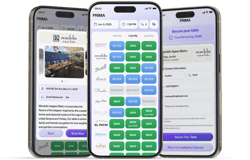Responsibilities
- Lead and contribute to the development, adaptation, and application of one or more of the following biological foundation models: sequence, structure, single cell, imaging, phenotype and more. Lead and contribute to the development, adaptation, and application of integrated biological foundation models that bridge modalities and scales
- Collaborate with internal and external research partners to extend model capabilities and translate cutting-edge methods into applied biological insights.
- Design and execute experiments leveraging pan-modal biological data, from single-cell and spatial transcriptomics to multi-omic datasets.
- Identify high-impact opportunities for model-driven discoveries, validation studies, and new biological use cases.
- Mentor junior researchers and contribute to a culture of scientific excellence and innovation.
- Communicate research outcomes in internal/external reports, presentations, and top-tier journals/conferences.
Required Qualifications
- MSc / PhD (or equivalent expertise) in Computational Biology, Machine Learning, Bioinformatics, or a related technical field.
- Proven track record in research and innovation in the AI for biology space as demonstrated through publications in top-tier AI/ML (e.g., NeurIPS, ICML, ICLR) and/or core biology (e.g., Nature, Science, Cell) venues.
- Experience developing and debugging deep learning models in PyTorch, JAX, or TensorFlow, ideally with an emphasis on generative models, graph neural networks, or large-scale biological data applications.
- Strong understanding of biological data modalities, including some of the following: Single-cell RNA-seq, Single cell epigenetic data, Structure data analysis, Analysis of biomedical imaging data, Human phenotype data or other modalities that are relevant to the human simulation vision.
- Passion for interdisciplinary research at the intersection of AI and Biology, and willingness to acquire domain-specific expertise.
- Motivated and self-directed, capable of operating in a fast-paced, startup environment.
- Familiarity with software engineering best practices (version control, documentation, testing) and a record of open-source contributions preferred.
Preferred Qualifications
- 3+ years of postdoctoral or industry experience applying ML to biological data.
- Experience with genomics, transcriptomics, or proteomics datasets and functional assays (e.g., ATAC, Hi-C, CAGE).
- Familiarity with multi-omics, health, or EHR datasets and public data repositories (NCBI, ENCODE, ENSEMBL, TCGA, UK Biobank).
- Experience integrating and curating biological datasets for model training or hypothesis generation.
- Knowledge of multimodal or multiscale models, including transformers, diffusion models, VAEs, or graph neural networks.
- Prior exposure to large-scale distributed training and inference environments, and ML on accelerators.
- Background in network or systems biology, including gene regulatory networks, clustering, and embedding algorithms.
Top Skills

What We Do
GenBio.AI, Inc. (GenBio AI) is an innovative global startup dedicated to developing the world's first AI-driven Digital Organism, an integrated system of multiscale foundation models for predicting, simulating, and programming biology at all levels.
Our goal is to achieve comprehensive, actionable empirical understandings of the mechanisms underlying all organismal physiologies and diseases. This will pave the way for a new paradigm in drug design, bio-engineering, personalized medicine, and fundamental biomedical research, all powered by Generative Biology.
Our founding team consists of world-renowned scientists and researchers in AI and Biology from prestigious institutions such as CMU, MBZUAI, WIS, alongside prominent financial investors.
GenBio AI, a true global effort from day one, is establishing offices in Palo Alto, Paris, and Abu Dhabi.


.png)





